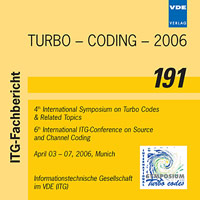On the link between the synchronization recovery and soft decoding of Variable Length Codes
Conference: TURBO - CODING - 2006 - 4th International Symposium on Turbo Codes & Related Topics; 6th International ITG-Conference on Source and Channel Coding
04/03/2006 - 04/07/2006 at Munich, Germany
Proceedings: TURBO - CODING - 2006
Pages: 6Language: englishTyp: PDF
Personal VDE Members are entitled to a 10% discount on this title
Authors:
Malinowski, Simon; Jégou, Hervé (IRISA, University of Rennes, France)
Guillemot, Christine (IRISA/INRIA, Campus de Beaulieu, Rennes, France)
Abstract:
Methodologies to analyze error recovery properties of Variable Length Codes (VLCs) have been introduced in "J. Maxted and J. Robinson, Error recovery for variables length codes”, and "P. F. Swaszek and P. DiCicco, More on the error recovery for variable length codes". In this paper, we extend these methods to analyze the error-resilience of VLCs when soft decoding with length constraint strategies are applied at the decoder side. The approach allows in particular computing the amount of information conveyed by the length constraint on a trellis, and hence the maximum amount of information that a soft VLC decoder, augmented with a length constraint, will be able to exploit. Then, this amount of information, as well as the probability that the VLC decoder does not re-synchronize in a strict sense, are shown not to be significantly altered by appropriate trellis states aggregation. This proves that the performances of a Viterbi decoder run on aggregated state models with a length constraint can be optimal with a significantly reduced complexity compared with the bit/symbol trellis.


